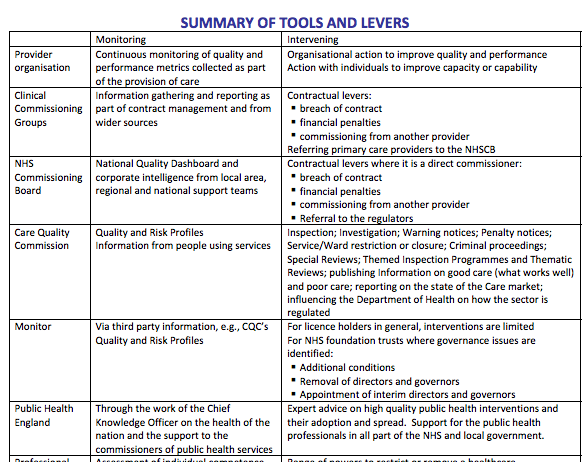If you’re trying to trace a document trail or identify who is accountable for a particular decision, it’s essential to understand the structure of the health service.
The way the National Health Service is set up in England (Scotland, Wales and Northern Ireland will be dealt with in future posts) can be complex but it is relatively simple once you understand how each department works.
As the structure is now you have the Department of Health (DoH), led by the Secretary of State for Health, who in turn leads DoH ministers. The DoH funds ten strategic Health Authorities (SHAs), who are responsible for 152 Primary Care Trusts (PCTS), which in turn provide hospitals, mental health trusts, ambulance trusts, GP practices, dental practices, pharmacies which will also cover sectors such as primary care service, Foundation trusts, NHS trusts, private companies and charities.
The new proposed structure for April 2013 will look slightly different as the Primary Care Trusts and Strategic Health Authorities will be replaced by NHS Commissioning groups, which are constructed of 200+ Clinical Commissioning Groups (CCGs) that will be led by GPS who will oversee and manage the community, as well as acting as representatives for the boards such as NHS trusts, Foundation trusts, private companies etc.
There will also be a new feature, which will be added to the NHS in England, will be the new group Healthwatch England.
A national body representing the views, opinions of the people who use health and social care services, ot will represent a large network of local Healthwatch groups (taken over by LINK), which will be funded by local authorities.
It is claimed that these Healthwatches will help improve the services from the views of patients and carers during local commissioning decisions, the purpose being to make them run more efficiently, fairly and smoothly.
What is the department of Health’s organogram?
In December 2011 the Department of Health published an ‘organogram’. This is a database system which shows detailed info on the structure and costs of the department of health staff posts i.e. senior posts and costs of junior staff of the organisation as at 5 December 2011.
For example: the senior posts spreadsheet lists a variety of job titles such as private secretary, senior communications manager, executive assistant, Business manager, HR officer, press and media officer, and finance manager.
These all report to the overall professions such as Operational delivery, communications, human resources, informational technology, Policy, Internal audit, Informational Technology, Knowledge and Information manager etc.
Knowing where different roles report to can save you a lot of time in identifying who you need to approach in asking questions.
The junior posts (CSV) are responsible for different functions within the department such as leadership management, Internal audit efficiency strategy officers, Policy research programmes, PR, HR roles, NHS communication etc.
All junior posts report to the senior posts and the Department of Health, which covers money and costs.
Can you add anything? Or are there areas that need expanding or clarifying? Please let us know.

